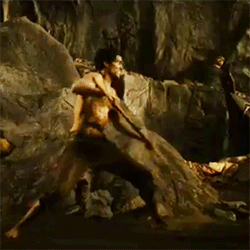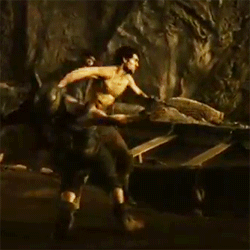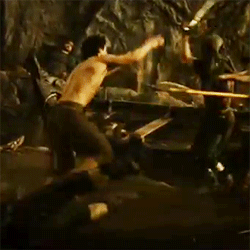-Name: Gruffydd Haern
-Age: 26
-
-Gender: Male
-Background:
Not far south of Camelot, betwixt the demesnes of counts and earls and dukes—the illustrious members of the kingdom’s peerage—lies a small, inconsequential plot of land: the demesne of Baron Berthold Haern III. Berthold is an old man, and has been for a long time. His first wife died some two and one half decades before now, after twice as many years, or somewhere thereabouts, of faithful union. She left him three sons, the second bearing his name and the first set to inherit his moderate existence of irrelevancy. Berthold has been content in his life for a long time, but even content hearts, as his was by a young maiden, a woman by the name of Delwen from the eastern feet of the Black Mountains. Taken as he was with her, he decided to marry her.
There was outcry amongst the peerage. Something about “belittling the dignity of station.” But he was old, had an heir of wholly noble birth, and had little land of littler consequence, so everyone decided they had more important things to worry about. So, they were wed. Berthold was, despite his age, able to rise to his station, and Gruffydd was born. And very few people actually cared. None of his brothers saw him as a threat, the youngest being over a decade his senior, and the peerage still had more important things to worry about.
As one might imagine, Berthold didn’t take much of an active role in the raising of his son, being both nobility and old. That is not to say that he was absent from Gruffydd’s life, but he left much of the child-rearing to his servants, and to his wife. And Delwen made for an interesting mother. It was not known beyond a small circle of confidants—which, for the record, did include her husband— but she revered the old gods of Prydain—as, according to her, Britannia was known before the Romans came. As one might expect, she passed this down to her son. He maintained the illusion of Christian faith—this involved much more sneaking around the castle than one might expect—and otherwise had the sort of childhood one might expect for fourth son of an insignificant Baron. No, things did not become interesting for Gruffydd until he neared manhood.
Gruffydd showed a natural aptitude for the art of the blade, and that was what would bring him out of obscurity. That wouldn’t come until much later, of course, but the fact remains that he was something of a prodigy. He entered into the tutelage of his eldest brother, Cane, as a page, and then as a squire. When the time came for him to take his knightly vows, however, his heart lurched. He could not reveal his worship, and to not swear oaths before the Christian God would draw far too much suspicion. To his mind, he had no other choices left to him than to go forward. When the time came to take his knightly oaths, his voice and tongue formed the words of the church, but his heart sung the names of his own gods. Chivalry to Belyr, wisdom to Gwydion, strength to Aeron, and countless others. When he stood his vigil, he would later swear—to his closest confidants—that he saw the good folk dancing in the shadows, just beyond where he could make them out clearly. This emboldened him in his purpose, and so he set out to a Knight among knights, one of the greatest in the land. His ambition lay nowhere beneath the Round Table.
His chance for distinction soon came. A handful of months later, the Saxons descended on Britannia
Berthold was far too old to lead the levy from his demesne, so he sent Cane in his stead. Gruffydd and his other brothers led smaller portions of the force, under Cane’s command. The war was as it was—no man nor woman needs it recounted, for all living know what the Saxon scourge wrought—What needs recounting here is only the Siege of Gains Castle, towards the end of the war. Cane and the men under him, including Gruffydd and his brother Hugh—the third, named Geoffry, having already died over the course of the war—were stationed to a castle near the southern coast, as the Saxons were being pushed back into the sea. They were preparing a grand assault to finish their foe, when the Saxons struck at them fiercely. They made no efforts for a protracted siege—the reasons for this are unclear, but those who care usually point to a lack of supplies for the Saxons to last such a siege.
From dawn to dusk, the Saxons assaulted the castle five times. During the fifth and final attack, a stray arrow sent Hugh toppling from the eastern wall. Gruffydd was soon there to command the soldiers, but in the leaderless confusion, the Saxons had forced an opening and begun to surge up their siege ladders.
The bards would tell you that Gruffydd fought them, man to man, alone. Fifty horrid barbarians, clad in fur and steel, surrounding and strking him like a mass of strength and terror. The bards are fools.
Gruffydd was not alone, and were it not for the men he led, he would have died that day, tand the castle likely would have been lost. He makes a point causing harm to every bard that forgets this; those men bled with him, died for him, and he’ll not have them be forgotten.
The folly of bards aside, the fight was a sight to behold. For three hours, the men of the eastern wall held against the Saxons until, one by one, they cut the ropes of their siege ladders and sent them tumbling to the ground below.
The moon was at zenith when an army led by Sir Gawain arrived, crushing the exhausted Saxons into a rout. There were others, in other places, but these ones would do no more fighting. As has already been made clear, Gruffydd’s legend would be suitably blown out of proportion, but at the time he ust wandered off to bed as soon as the Kight of the Round Table dismissed him.
In recognition for the valor shown by their levy, Berthold’s lands were expanded after the war; a goodly number of lords were killed and left heirless by the war, and so were granted to the aging Baron, making him a Count of some consequence, which shall be inherited by Cane, and the fruits of which shall always be Gruffydd’s to return to and call upon.
-Traits of Avalon:
∞-The Wolf’s Teeth: Gruffydd showed promise as a swordsman from an early age. Having trained under the tutelage of his eldest brother for years, he has grown into one of the kingdom’s most fearsome warriors. While some of the stories about him are plainly absurd, he is still a fearsome foe that anyone would hesitate to face.
∞-The Fox’s Feet: Worshiping gods that your world has denied is not something that can be done in the open. Gruffydd has developed great skill in secreting himself around unseen to and from hidden shrines and rituals. Of course, he wouldn’t be opposed to using those skills for other purposes.



















